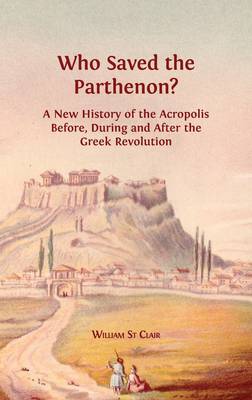
- Retrait gratuit dans votre magasin Club
- 7.000.000 titres dans notre catalogue
- Payer en toute sécurité
- Toujours un magasin près de chez vous
- Retrait gratuit dans votre magasin Club
- 7.000.0000 titres dans notre catalogue
- Payer en toute sécurité
- Toujours un magasin près de chez vous
Who Saved the Parthenon?
A New History of the Acropolis Before, During and After the Greek Revolution
William St Clair
Livre relié | Anglais
123,95 €
+ 247 points
Format
Description
In this magisterial book, William St Clair unfolds the history of the Parthenon throughout the modern era to the present day, with special emphasis on the period before, during, and after the Greek War of Independence of 1821-33. Focusing particularly on the question of who saved the Parthenon from destruction during this conflict, with the help of documents that shed a new light on this enduring question, he explores the contributions made by the Philhellenes, Ancient Athenians, Ottomans and the Great Powers.
Marshalling a vast amount of primary evidence, much of it previously unexamined and published here for the first time, St Clair rigorously explores the multiple ways in which the Parthenon has served both as a cultural icon onto which meanings are projected and as a symbol of particular national, religious and racial identities, as well as how it illuminates larger questions about the uses of built heritage. This book has a companion volume with the classical Parthenon as its main focus, which offers new ways of recovering the monument and its meanings in ancient times.
St Clair builds on the success of his classic text, The Reading Nation in the Romantic Period, to present this rich and authoritative account of the Parthenon's presentation and reception throughout history. With weighty implications for the present life of the Parthenon, it is itself a monumental contribution to accounts of the Greek Revolution, to classical studies, and to intellectual history.
Marshalling a vast amount of primary evidence, much of it previously unexamined and published here for the first time, St Clair rigorously explores the multiple ways in which the Parthenon has served both as a cultural icon onto which meanings are projected and as a symbol of particular national, religious and racial identities, as well as how it illuminates larger questions about the uses of built heritage. This book has a companion volume with the classical Parthenon as its main focus, which offers new ways of recovering the monument and its meanings in ancient times.
St Clair builds on the success of his classic text, The Reading Nation in the Romantic Period, to present this rich and authoritative account of the Parthenon's presentation and reception throughout history. With weighty implications for the present life of the Parthenon, it is itself a monumental contribution to accounts of the Greek Revolution, to classical studies, and to intellectual history.
Spécifications
Parties prenantes
- Auteur(s) :
- Editeur:
Contenu
- Nombre de pages :
- 898
- Langue:
- Anglais
Caractéristiques
- EAN:
- 9781783744626
- Date de parution :
- 12-05-22
- Format:
- Livre relié
- Format numérique:
- Genaaid
- Dimensions :
- 156 mm x 234 mm
- Poids :
- 1419 g

Les avis
Nous publions uniquement les avis qui respectent les conditions requises. Consultez nos conditions pour les avis.






